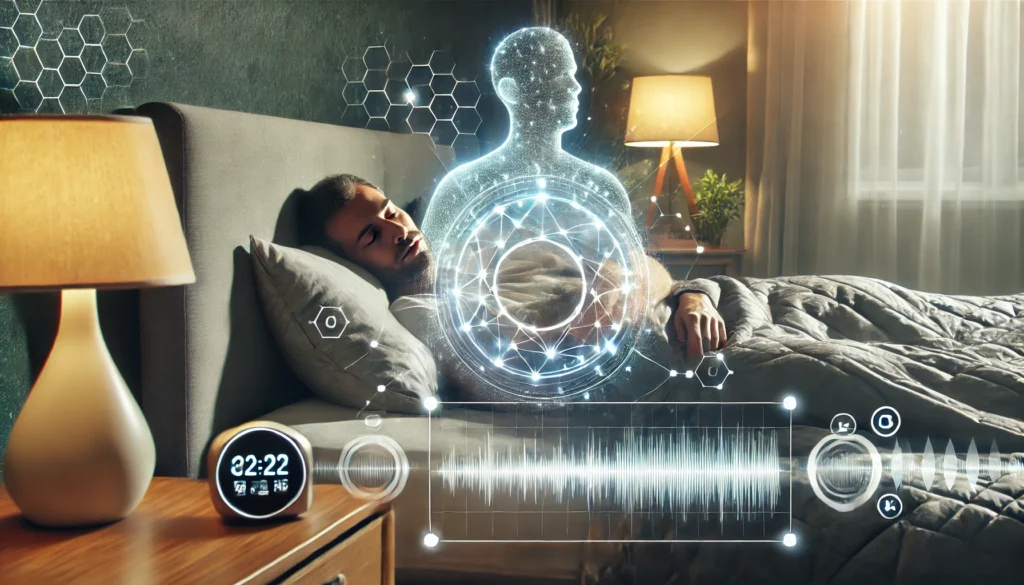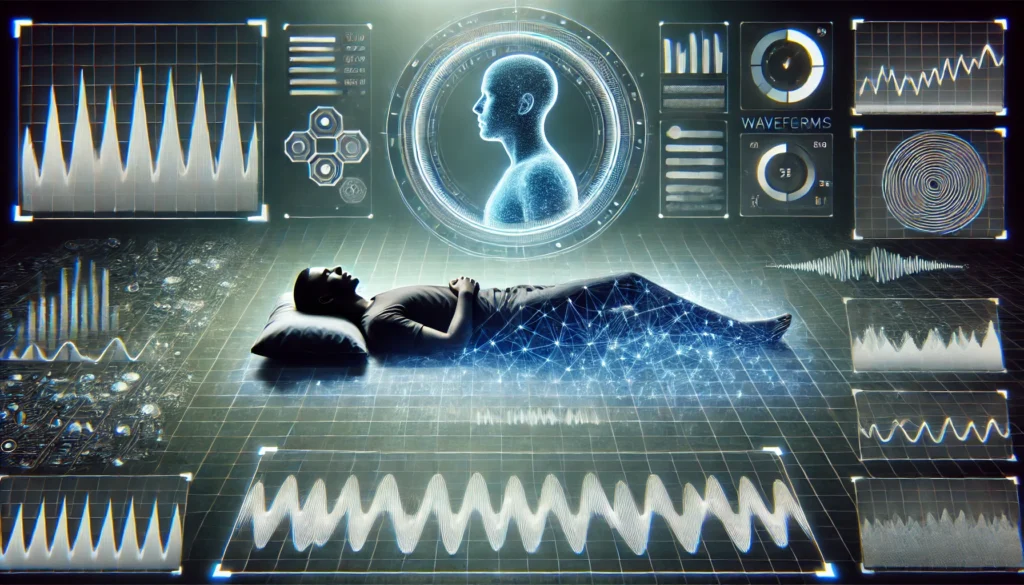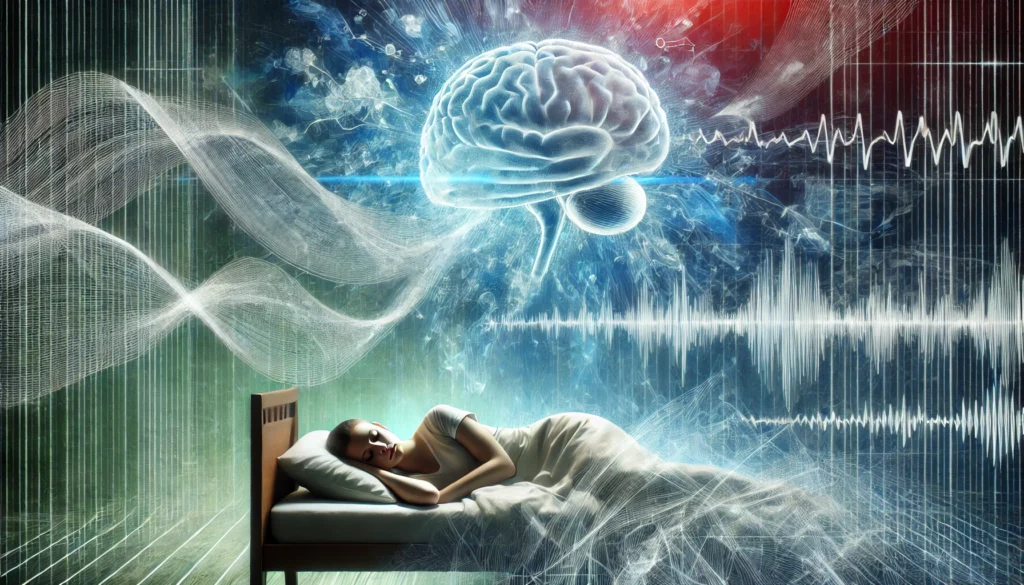Sleep is a fundamental biological process, essential for maintaining physical and mental health. It is during sleep that the body undergoes critical restorative processes, including tissue repair, muscle growth, and protein synthesis. Moreover, sleep plays a vital role in cognitive functions such as memory consolidation, problem-solving, and emotional regulation.
You may also like: The Connection Between Sleep and Memory
The Science Behind Sleep
Sleep consists of multiple stages, including rapid eye movement (REM) and non-REM sleep. Each stage serves a unique purpose and is characterized by distinct physiological and neurological activities. Non-REM sleep is crucial for physical restoration, while REM sleep is associated with vivid dreams and cognitive processing.
The intricate dance between these stages is orchestrated by the brain’s internal clock, which regulates the sleep-wake cycle. Understanding the nuances of these cycles can help individuals tailor their sleep habits to maximize restorative benefits. Moreover, the duration and quality of each stage can vary based on factors like age, lifestyle, and health conditions.
Modern technology has enabled us to gather detailed sleep data, shedding light on how much time we spend in each sleep stage, our sleep efficiency, and disruptions that may occur throughout the night. This data is invaluable for understanding personal sleep patterns and identifying potential issues that may affect overall health.
The Importance of Sleep Cycles
The body cycles through different stages of sleep approximately every 90 minutes. Each cycle involves transitions between light sleep, deep sleep, and REM sleep. Deep sleep, typically occurring in the early part of the night, is vital for physical recovery, while REM sleep, more prevalent in the later cycles, is essential for mental and emotional restoration.
Understanding sleep cycles is crucial for optimizing sleep quality. Disruptions in these cycles, whether due to environmental factors or lifestyle habits, can lead to sleep fragmentation and reduced restorative benefits. Ensuring a complete cycle can improve mood, memory, and overall health.
Sleep and Hormonal Regulation
Sleep is closely tied to the regulation of hormones that affect various bodily functions. During sleep, the body produces and regulates hormones such as cortisol, melatonin, and growth hormones. These hormones play roles in stress response, sleep-wake cycles, and growth and development.
Sleep disruptions can lead to hormonal imbalances, affecting metabolism, immune function, and emotional stability. By understanding the hormonal interplay during sleep, individuals can appreciate the broader impacts of sleep quality on their health and take steps to maintain hormonal balance through adequate rest.
Cognitive and Emotional Benefits
The cognitive and emotional benefits of sleep are profound. Sleep enhances learning and memory by consolidating new information and strengthening neural connections. It also plays a critical role in emotional regulation, helping individuals process emotions and cope with stress.
During REM sleep, the brain processes emotional experiences, which aids in emotional resilience and mental health. Lack of sleep impairs these processes, leading to mood swings, irritability, and increased susceptibility to mental health issues. Prioritizing sleep can thus support both cognitive performance and emotional well-being.
Analyzing Sleep Data
With the advent of wearable technology and mobile apps, sleep data has become increasingly accessible. Devices such as smartwatches and fitness trackers monitor sleep duration, quality, and disturbances, providing users with comprehensive insights into their nightly rest.
The Benefits of Tracking Sleep
Tracking sleep offers numerous benefits, including the ability to pinpoint factors that may be negatively impacting sleep quality. By analyzing sleep data, individuals can make informed decisions to improve their sleep hygiene, such as adjusting their bedtime routine, reducing caffeine intake, or creating a more conducive sleep environment.
Sleep trackers provide visual representations of sleep patterns, helping users identify trends over time. This visibility empowers individuals to take proactive steps in managing their sleep health. For instance, recognizing patterns of sleep disruption can lead to lifestyle adjustments that promote better rest, such as consistent bedtime schedules and reduced screen time before bed.

Insights from Sleep Data
Sleep data not only highlights sleep duration and quality but also reveals insights into sleep efficiency and disturbances. Sleep efficiency measures the percentage of time spent asleep while in bed, providing an indicator of overall sleep quality. Identifying disturbances like sleep apnea or restless leg syndrome can prompt further investigation and intervention.
Understanding these insights can guide individuals in optimizing their sleep environment and routines. For example, ensuring a dark, quiet room can reduce disturbances, while a comfortable mattress and pillow can enhance sleep quality. By leveraging sleep data, individuals can tailor their sleep environment to their specific needs.
Challenges in Sleep Data Interpretation
Despite the wealth of information provided by sleep trackers, interpreting this data can be challenging. Variability in sleep patterns, individual differences, and the limitations of consumer-grade devices can lead to discrepancies between reported and actual sleep quality. It is essential to approach sleep data with a critical eye and consider consulting healthcare professionals for a comprehensive evaluation.
Sleep data interpretation requires an understanding of the limitations and potential inaccuracies of tracking devices. Factors such as device placement, sensitivity, and algorithm accuracy can affect data reliability. Consulting with sleep specialists can help individuals interpret their data accurately, providing a holistic view of their sleep health.
The Role of Professional Guidance
While sleep tracking technology offers valuable insights, professional guidance remains essential for comprehensive sleep analysis. Sleep specialists can provide expertise in interpreting complex sleep data, diagnosing sleep disorders, and recommending personalized interventions. Their insights are crucial for addressing underlying issues that may not be apparent from data alone.
Professional guidance can also help individuals navigate the psychological aspects of sleep, such as stress or anxiety-related sleep disturbances. By combining technology with expert advice, individuals can achieve a more complete understanding of their sleep health and implement effective strategies for improvement.
The Impacts of Sleep on Health
The relationship between sleep and health is well-documented, with numerous studies highlighting the importance of adequate rest for physical and mental well-being. Insufficient sleep has been linked to a myriad of health issues, including obesity, cardiovascular disease, diabetes, and mental health disorders.
Cognitive and Emotional Well-being
Sleep is integral to cognitive functions such as attention, learning, and memory. A lack of sleep impairs these functions, leading to decreased productivity, impaired judgment, and difficulty concentrating. Furthermore, sleep deprivation can exacerbate emotional disturbances, increasing the risk of anxiety and depression.
Sleep supports brain health by facilitating neuroplasticity, the brain’s ability to reorganize and form new connections. This process is crucial for learning and adaptation. Sleep deprivation disrupts these processes, leading to cognitive deficits and emotional dysregulation. Prioritizing sleep can thus enhance cognitive resilience and emotional stability.
Physical Health and Immunity
Sleep also plays a critical role in maintaining physical health. It supports the immune system, enhancing the body’s ability to fight infections and inflammation. Chronic sleep deprivation can weaken immune defenses, making individuals more susceptible to illnesses.
During sleep, the body produces cytokines, proteins that help fight infections and reduce inflammation. Adequate sleep ensures a robust immune response, while sleep deprivation reduces cytokine production, compromising immune function. Emphasizing sleep can therefore bolster immune health and reduce the risk of chronic conditions.
Metabolic and Cardiovascular Health
Sleep is closely linked to metabolic and cardiovascular health. Insufficient sleep can disrupt metabolic processes, leading to weight gain and increased risk of diabetes. It also affects cardiovascular health by contributing to hypertension and increasing the risk of heart disease.
The body’s ability to regulate glucose and insulin is influenced by sleep quality. Sleep deprivation alters hormone levels, promoting appetite and reducing energy expenditure. Additionally, poor sleep affects blood pressure regulation, increasing cardiovascular strain. By prioritizing sleep, individuals can support metabolic balance and cardiovascular health.
The Paradox of Sleep Deprivation
While adequate sleep is essential for optimal health, there are instances where sleep deprivation may have temporary benefits. For example, sleep deprivation has been used as a therapeutic intervention for certain mood disorders, such as depression, with some individuals experiencing improved symptoms following a night of reduced sleep.
Temporary Cognitive Boosts
In some cases, short-term sleep deprivation may lead to temporary increases in creativity and problem-solving abilities. This phenomenon is thought to result from heightened neural activity and increased stress hormones, which can enhance cognitive performance in the short term. However, these effects are not sustainable, and prolonged sleep deprivation is detrimental to overall health.
The temporary cognitive boosts from sleep deprivation are often accompanied by increased arousal and altered brain chemistry. These changes can lead to heightened alertness and unconventional thinking. However, the long-term effects of sleep deprivation, such as cognitive decline and emotional instability, outweigh these temporary gains.
Therapeutic Uses of Sleep Deprivation
Sleep deprivation has been explored as a therapeutic tool in controlled settings, particularly for mood disorders like depression. In some cases, partial sleep deprivation can lead to rapid mood improvements, offering a temporary reprieve from depressive symptoms. However, these effects are typically short-lived and require careful management.
The therapeutic use of sleep deprivation involves structured protocols and professional oversight to minimize potential risks. While it may offer temporary symptom relief, it is not a substitute for comprehensive treatment approaches. Understanding the limitations and potential benefits of this intervention is crucial for its safe application.
Weighing the Risks and Benefits
While there may be specific scenarios where sleep deprivation offers temporary advantages, it is crucial to balance these benefits against the potential health risks. Chronic sleep deprivation can have severe consequences, including impaired cognitive function, emotional instability, and increased susceptibility to chronic diseases.
The decision to use sleep deprivation as an intervention should be made with caution, considering the individual’s overall health and well-being. Weighing the risks and benefits requires a thorough understanding of the potential impacts on cognitive, emotional, and physical health. In most cases, prioritizing adequate sleep is the safest and most beneficial approach.

Current Trends and Future Implications
As technology continues to advance, the future of sleep data collection and analysis holds promising potential for improving health outcomes. Emerging trends such as personalized sleep interventions and artificial intelligence-driven sleep optimization may revolutionize the way we approach sleep health.
Personalized Sleep Solutions
Advancements in wearable technology and machine learning algorithms allow for personalized sleep recommendations tailored to individual needs and preferences. These solutions may include customized sleep schedules, targeted interventions, and real-time feedback to enhance sleep quality.
Personalized sleep solutions leverage data to create individualized sleep plans that consider factors like lifestyle, environment, and health conditions. By offering tailored recommendations, these solutions empower individuals to optimize their sleep patterns and address specific challenges, such as insomnia or irregular sleep schedules.
The Role of Artificial Intelligence
Artificial intelligence (AI) is poised to play a significant role in the future of sleep research. AI algorithms can analyze vast datasets to identify patterns and correlations, enabling researchers to uncover new insights into the complex relationship between sleep and health. This knowledge may inform the development of innovative treatments and preventive measures for sleep-related disorders.
AI-driven sleep research can lead to breakthroughs in understanding sleep disorders and identifying early warning signs of health issues. By integrating AI with sleep data, researchers can develop predictive models and interventions that enhance sleep health and overall well-being.
The Potential of Sleep Technology
The integration of technology into sleep research and management offers exciting possibilities for the future. Innovations such as smart mattresses, sleep-enhancing wearables, and virtual sleep coaches are transforming the landscape of sleep health. These technologies provide users with actionable insights and support for improving sleep quality.
The potential of sleep technology lies in its ability to offer holistic and accessible solutions for individuals seeking to enhance their sleep health. As these technologies continue to evolve, they promise to make sleep optimization more attainable for a broader audience, contributing to improved health outcomes and quality of life.

Conclusion
Understanding sleep data and its impacts is essential for optimizing health and well-being. While the benefits of sleep deprivation may be context-specific, the overall importance of adequate rest cannot be overstated. By leveraging technology to monitor sleep patterns and adopting personalized interventions, individuals can take proactive steps to improve their sleep quality and enhance their overall health.
Ultimately, sleep is a vital component of a healthy lifestyle, and prioritizing it can lead to significant improvements in physical, cognitive, and emotional well-being. As we continue to explore the depths of sleep science, the potential for optimizing sleep and its impacts on health remains an exciting frontier.
Investing in sleep health can yield profound benefits, from boosting immune function to enhancing cognitive performance. By embracing the insights offered by modern sleep technology and research, individuals can unlock the full potential of restorative sleep and enjoy a healthier, more fulfilling life.
Further Reading:
Extent and Health Consequences of Chronic Sleep Loss and Sleep Disorders
REM, light, deep: how much of each stage of sleep are you getting?
Important Note: The information contained in this article is for general informational purposes only, and should not be construed as health or medical advice, nor is it intended to diagnose, prevent, treat, or cure any disease or health condition. Before embarking on any diet, fitness regimen, or program of nutritional supplementation, it is advisable to consult your healthcare professional in order to determine its safety and probable efficacy in terms of your individual state of health.
Regarding Nutritional Supplements Or Other Non-Prescription Health Products: If any nutritional supplements or other non-prescription health products are mentioned in the foregoing article, any claims or statements made about them have not been evaluated by the U.S. Food and Drug Administration, and such nutritional supplements or other health products are not intended to diagnose, treat, cure, or prevent any disease.


